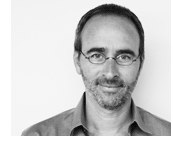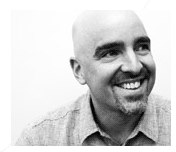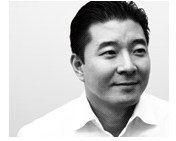There's a lot of talk about disruption in the venture capital world. We've discussed at length the shift that many VCs are making from simply writing a check to serving as a hands-on, end-to-end service driven by seasoned operators and former founders.
Chicago-based Lightbank, the VC firm started by Groupon seed investors Eric Lefkofsky and Brad Keywell, have a similar approach but with one major difference: the firm's fund, which is around $200 million, is composed of mainly Keywell and Lefkofsky's personal money, not that of LPs (NEA has put a small amount in the firm, but is not considered an L.P.).
As Lefkofsky explains, he, Keywell, and fellow partner Paul Lee are attempting to build their own mini Berkshire Hathaway of the technology sector. "We're looking for value anywhere where we can find it," Lefkofsky says. What does that mean exactly? Basically nothing is off-limits. The firm is full-stack, making seed, Series A, or even later stage investments and has invested in 56 companies since the launch of the fund in 2010.
Current investments include DoubleDutch, Beachmint, Udemy, Sprout Social, Ark, OnSwipe, Qwiki, Zaarly and others. After two years, Lightbank has even had a few exits–CleverSense was bought by Google, 60mo was acquired by FreeAgent and WhereI'veBeen was purchased by TripAdvisor. The shop's most recent incubation, loyalty startup Belly, just raised $10 million from Andreessen Horowitz.
Lefkofsky and Keywell are the very definition of serial entrepreneurs. They are probably best known for their recent involvement with Groupon, but the duo has been founding startups together for nearly 20 years. After meetingt at the University of Michigan. they founded promotional merchandising company Starbelly in 1999 and sold the company to Ha-Lo for $240 million. In 2001, they founded InnerWorkings, a print and procurement company that was taken public in 2006. In 2005, Lefkofsky and Keywell started Echo Global Logistics, a transportation and logistics management company that went public in 2009. In 2006, the pair co-founded MediaBank, a data-driven media-buying platform. And in 2007, they seeded Groupon.
They are not without controversy, which you can read about here. They were sued over Ha-Lo's eventual bankruptcy; and Groupon's post-IPO life has been tumultuous, including drama over financials, and taking money off the table. Over the summer, Lefkofksy stepped back from the company to focus on Lightbank.
 Lefkofsky acknowledges that the view of Groupon does affect the perception of Lightbank but points out that the company, although valued at less than what it was at the time of its IPO, is still worth billions of dollars and bringing in revenue. "There are many views of Groupon depending on where you live and your community," he explains. He says that there is a polarizing view of the company in the startup investment community in San Francisco, and a different view of the company in the public markets in New York. In Chicago, people view Groupon through a different lens. "Most people dream of building a business of Groupon's scale, and the fact is that the experience we had building Groupon, InnerWorkings, Echo and others only helps us help founders operate their businesses. Most of the founders who want to work with us at Lightbank are excited to learn from our relationship and view us as partners."
Lefkofsky acknowledges that the view of Groupon does affect the perception of Lightbank but points out that the company, although valued at less than what it was at the time of its IPO, is still worth billions of dollars and bringing in revenue. "There are many views of Groupon depending on where you live and your community," he explains. He says that there is a polarizing view of the company in the startup investment community in San Francisco, and a different view of the company in the public markets in New York. In Chicago, people view Groupon through a different lens. "Most people dream of building a business of Groupon's scale, and the fact is that the experience we had building Groupon, InnerWorkings, Echo and others only helps us help founders operate their businesses. Most of the founders who want to work with us at Lightbank are excited to learn from our relationship and view us as partners."
Why Start A VC Firm?
As Keywell tells the story, a few years ago he and Lefkofsky realized that they had four successes in a row, and the likelihood of having more successful businesses in a row was low. The pair had been investing in things on the side but formalized it with an actual VC fund. So they decided to create Lightbank, partly as a way to diversify and also to help "magnify" the knowledge they had learned from their experiences. As mentioned above, Keywell and Lefkofsky started out with $100 million in 2010 and have put additional dollars that amount to being the total amount to be invested to $200 million.
Another unique aspect of Lightbank is the actual partnership between Keywell and Lefkofsky. It has spanned nearly 20 years, and it's an impressive feat to be able to start several businesses with the same person over that length of time.
Lefkofksky highlights the fact that he and Keywell are aligned in their goals, and Keywell agrees, explaining that both have a relentless focus on the same goals. He adds that the relationship has survived because they both love to do what they do-found companies. And they know when the "hand off the baton" to the other when it comes to each's strengths and weaknesses.
Lekofksy and Keywell don't look at themselves as traditional VCs. "Most people in the VC world are in the business of building a fund. We're not in that business and we don't look at ourselves like that," Lefkofsky explains. "We are thinking about 'where do we want to put our own money,' and this changes everything. I am personally invested in this fund and I want to spend energy and time on each business."
Keywell says the goal of Lightbank has been fairly clear. "We build companies, help companies operate, and help them grow. Each company is a project with partners rather than an investment, and this is a meaningful and different perspective from other traditional VC firms. We've raised $1.75 billion in companies we've started ourselves, and we know what it is to be entrepreneurs," he says.
The firm incubates companies, makes seed investments, Series A investments and even provides later stage funding, all depending on the idea and entrepreneur. He adds that the beauty of not having LPs and investors to answer to is that the firm doesn't have to live by a tight investment thesis. The thesis, he says, is "to choose businesses to fund and partner with we can be helpful to. If we see an interesting idea, like the entrepreneur, see a fire in their belly, we'll likely invest."
 Lefkofsky highlights the innovations and disruptions happening in social, local and mobile as being of particular interest, but explains that the amount of the investments vary depending on the company, with Lightbank sometimes owning 1 percent of a company or, conversely, 80 percent of a company.
Lefkofsky highlights the innovations and disruptions happening in social, local and mobile as being of particular interest, but explains that the amount of the investments vary depending on the company, with Lightbank sometimes owning 1 percent of a company or, conversely, 80 percent of a company.
In 2010, Lightbank started out doing around 10 investments per year, but that has quickly ramped up to around 20 per year. The firm currently has invested in 56 companies. Part of this growth is attributed to the addition of Paul Lee as a partner. In early 2011, Lee came on as the firm's third partner, bringing extensive VC experience at Playboy Ventures and the Peacock Equity Fund, the venture arm of NBC Universal in New York, where he was a founding partner.
Lee, who says he is the cynic of the group, is an interesting juxtaposition to the operating experience from Lefkofsky and Keywell. Lee says that he saw an opportunity to team up with two brilliant operators and bring his traditional VC experience into the mix. He says that with no LPs, he sees each investment as more of a project. He doesn't think about drawing management fees but rather more about forming actual partnerships with founders.
Operators As VCs
Lightbank is a hands-on environment, and although it's not based in the middle of Silicon Valley, the firm's offices look and feel like a startup. Housed in the same building as Groupon, Lightbank's offices are more rugged that those you find on Sand Hill Road, with a warehouse type of feel.
And even the company's website has a cheeky, yet honest tone to it that makes you think they know what it's like to be a founder. Take its instruction on how to contact Lightbank for investment, '"step 1. convince your friends and family you're not "unemployed," you're an "entrepreneur.".'
Lee recalls a meeting with a founder in residence at the firm, where the entrepreneur proposed an idea for the business that Lee knew would never work. Lee was going to strongly discourage the founder from moving in that direction but Lefkofsky intervened and said that he should try the business plan.
When Lee pulled Lefkofsky aside to ask why he would support the founder trying something that surely would never work, Lefkofsky replied that the entrepreneur needs to make that mistake for himself so he won't make it again. Lee highlights Keywell and Lefkofsky's founder background as a key differentiator for the Lightbank experience.
Logan LaHive, the founder of Belly, confirms that Lefkofsky, Keywell, and Lee do not operate as VCs, but rather as business builders. First, LaHive and Lee met via Twitter and started a relationship from a conversation that took place on the social network. He then joined Lightbank as a founder in residence and launched Belly.
As a side note, this isn't the first time Lee sourced a deal or found talent via Twitter. He's found three VC deals from conversations on Twitter.
"With Brad, Eric, and Paul, it's not a check and someone will walk away. It's a deeper relationship than even a strategic advisor. They are going to tell you what they think. They are tough, because they have been there and done that and know what it takes to succeed — and have proven over time they have a formula for scaling businesses," LaHive explains. He adds that when Lightbank gets excited about an idea, they move fast, and scale quickly. He says that he built and launched Belly only three months after joining the firm.
In building his own startup, what really impressed LaHive about Lightbank was that the firm put infrastructure in place to help with legal, HR, accounting, and PR, as well as how to set up a sales organization and more. "They are brilliant executors and they are invested in helping me become a better operator," he adds.
Keywell, Lefkofsky and Lee all agree that their experiences as operators provide a unique advantage over VCs that have never founded or run a startup. "I'm not sure why there aren't more operators in the traditional VC world," says Keywell. But he thinks that the bar is being raised with firms like Andreessen and of course, Lightbank, because founders are going to realize that partnerships are worth more than just a check, and they need to maximize their reward and minimize risk.
"I think the biggest differentiator for Lightbank is that we are operators, and that's one of the things that we really bring to the table," says Lefkofsky.
 And the agency model where VCs provide services beyond just investment is now the norm in the VC world. Kleiner, Andreessen and others are bulking up on talent to help portfolio companies. Similarly, Lightbank has the resources to help startups execute, including engineering, PR, human resources, marketing and more. In particular, Lightbank, with Lefkofsky and Keywell's experience, has mastered the customer acquisition space and scaling a sales team.
And the agency model where VCs provide services beyond just investment is now the norm in the VC world. Kleiner, Andreessen and others are bulking up on talent to help portfolio companies. Similarly, Lightbank has the resources to help startups execute, including engineering, PR, human resources, marketing and more. In particular, Lightbank, with Lefkofsky and Keywell's experience, has mastered the customer acquisition space and scaling a sales team.
Jessica Kim, co-founder of children's toy startup BabbaCo, says that she felt that there weren't that many firms with an understanding of sales and inventory challenges that could help her run a company with physical products. The firm's strengths, she explains, are an extensive network and a full-service agency.
The firm recently established a three-month design program to match emerging graphic design talent with mentorship and real-world experience working with Lightbank-backed startups. Lightbank also launched a new program called LightbankStart, which aims to help students who want to start a company tap into the firm's resources to turn an idea into a product. The firm received a lot of backlash in response to the program's offer of $100,000 in exchange for 50 percent of a company's equity. But as Lee explains, this is for "napkin idea type things" and is more of a hybrid between incubating a company and forming an accelerator.
Beyond Chicago
Lightbank launched with a focus on investments in the Midwest. Keywell says that there is a "strong case to be made that Chicago is one of the great entrepreneurial ecosystems," and the firm works to enhance an ecosystem of startups and technology in the region. For example, Lightbank is an LP in Chicago's startup incubator, Excelerate. "One of the biggest benefits we have is that we aren't in the Valley. There are a ton of talented young people who have great ideas that are not just in the Bay Area," says Lefkofsky.
But the firm has been steadily spreading its wings beyond the region. Two-thirds of the firm's investments are now based outside of Chicago. "We think entrepreneurship happens everywhere, not just in San Francisco," explains Lee. "It's a misconception that our deals are only in Chicago" He says he's sourced deals in Omaha, Nebraska; Chicago, New York, and the Bay Area.
One region where Lightbank will be doubling is New York. The firm, which already has a number of deals in the area, is opening up an office in New York in the first quarter of 2013, which is its first formal office outside of Chicago. And ideally, says all three partners, by the end of the year, the firm will have a significant presence on the West Coast, East Coast and Chicago.
In terms of deal flow, Lefkofsky and Lee both say they get plenty of deal flow being in Chicago, but the firm does do a bit of travel. Lee says he's on the road a few weeks a month, either in San Francisco or New York.
As for how the venture world has changed since they started investing, Lefkofsky believes that with venture returns so mixed, it's a "hard to understand asset class." "Are people really making money in this business? Every so often there is an amazing fund like Accel's 2005 Fund IX. But there's little predictability now," says Lefkofsky. He envisions the future as full-stack funds that do all types of investments, whether that be seed, series A, late-stage funding, or even investment in public companies.
Lightbank is still relatively young for a VC firm, and it's clear that Keywell, Lefkofsky and Lee have open ambitions of scaling the firm to have the name recognition and investment success of Kleiner Perkins or Sequoia, but with a different makeup and model. Whether that will happen is still five to ten years out. Keywell says, "The jury is still out over whether we are great at this bit. This is the beginning of our journey as investors. That journey is called Lightbank and it's just getting started."
Disclosure: My husband was previously an employee of Groupon.
No hay comentarios:
Publicar un comentario